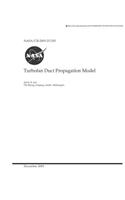
Turbofan Duct Propagation Model
Series:
The CDUCT code utilizes a parabolic approximation to the convected Helmholtz equation in order to efficiently model acoustic propagation in acoustically treated, complex shaped ducts. The parabolic approximation solves one-way wave propagation with a marching method which neglects backwards reflected waves. The derivation of the parabolic approximation is presented. Several code validation cases a
NaN
VOLUME
English
Paperback

The CDUCT code utilizes a parabolic approximation to the convected Helmholtz equation in order to efficiently model acoustic propagation in acoustically treated, complex shaped ducts. The parabolic approximation solves one-way wave propagation with a marching method which neglects backwards reflected waves. The derivation of the parabolic approximation is presented. Several code validation cases are given. An acoustic lining design process for an example aft fan duct is discussed. It is noted that the method can efficiently model realistic three-dimension effects, acoustic lining, and flow within the computational capabilities of a typical computer workstation.Lan, Justin H. and Posey, Joe W. (Technical Monitor)Langley Research CenterTURBOFANS; ACOUSTIC PROPAGATION; THREE DIMENSIONAL MODELS; COMPUTER TECHNIQUES; SOUND WAVES; REFLECTED WAVES; WAVE PROPAGATION; HELMHOLTZ EQUATIONS; LINING PROCESSES; COMPUTER SYSTEMS PERFORMANCE; WORKSTATIONS...
Price Comparison [India]
In This Series
Bestseller Manga
Trending NEWS




















